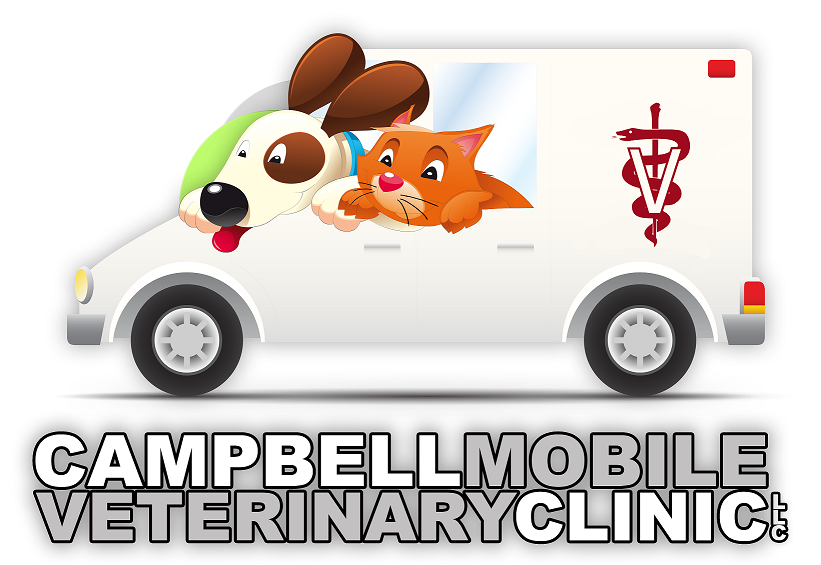 |
Campbell Mobile Veterinary Clinic |
|
Serving a 30-mile radius from Tremont, IL |
 |
Campbell Mobile Veterinary Clinic |
|
Serving a 30-mile radius from Tremont, IL |
(309)713-9907
www.campbellmobilevet.com
|
What You Need to Know Before Surgery Many people have questions about various aspects of their pet's surgery, and we hope this information will help. It also explains the decisions you will need to make before your pet's upcoming surgery. Is the anesthetic safe? Advances in anesthetic drugs and surgical monitors have made surgery much safer than in the past. Here at Campbell Mobile Veterinary Clinic, we take anesthesia and surgery seriously and thoroughly evaluate each individual pet prior to administering anesthetics or performing surgery to help ensure safety throughout these events. Using the information gathered through the physical exam, pre-anesthetic bloodwork profile and the patient's medical history, we tailor the dose and combinations of anesthetic drugs used to the health status and condition of every patient. In addition, every patient is continuously monitored by means of electronic surgical monitors and our skilled, certified veterinary technician from the time anesthesia is administered to the time the pet is awake. Pre-anesthetic bloodwork is an important part of reducing the risk of anesthesia. We require pre-anesthetic bloodwork on every pet prior to surgery. The results will help us determine if the liver and kidneys can handle the anesthetic and if there is any concern for anemia, dehydration or other processes that could affect the anesthetic or surgical event. Even outwardly healthy animals can have serious organ system problems that cannot be detected without blood testing. If we find a problem, it is much safer to diagnose it before it causes anesthetic or surgical complications. Special consideration will be taken for animals with minor dysfunction that does not preclude anesthesia and surgery. If serious problems are detected, routine surgery will be postponed until the problem is corrected. Depending on initial bloodwork results, and in cases of ill or geriatric pets, additional diagnostics (blood tests, electrocardiograms, x-rays, urine tests, etc) may be required prior to surgery as well. It is important that surgery be done on an empty stomach to reduce the risk of vomiting during and after anesthesia. Your pet will need to be fasted (food withheld) for at least 8 to 10 hours prior to surgery. Water can be left down for the pet until the morning of surgery.
For many surgeries, we use absorbable sutures underneath the skin. These will dissolve on their own, and do not need to be removed later. Some surgeries, especially tumor removals, do require skin sutures that will need to be removed. With either type of suture, it is imperative that you monitor the incision for swelling or discharge. While most dogs and cats do not interfere with their incisions, this is an occasional occurrence that you will also need to watch for. If there are skin sutures, they will usually need to be removed 10 to 14 days after surgery. You will also need to restrict your pet's activity level for a time and no baths are allowed for the first 10 days after surgery.
Anything that causes pain in people can be expected to cause pain in animals. Pets may not show the same symptoms of pain as people do; they usually don't whine or cry, but you can be sure they feel it. Pain medications needed will depend on the surgery performed. Major procedures require more pain relief than things like minor lacerations. For dogs, we may recommend an oral anti-inflammatory the day after surgery and several days after to lessen the risk of discomfort and swelling. We use newer medications, which are less likely to cause stomach upset and can be given even the morning of surgery. Injectable pain medications may also be used after surgery on both dogs and cats. Providing whatever pain relief is appropriate is a humane and caring thing to do for your pet. What other decisions do I need to make? While your pet is under anesthesia, it is the ideal time to perform other minor procedures, such as dentistry, ear cleaning, or implanting an identification microchip. If you would like an estimate for these extra services, please call ahead of time. This is especially important if the person dropping the pet off for surgery is not the primary decision maker for the pet's care. We will call you prior to your scheduled surgery appointment to confirm the appointment time and to answer any questions you might have. In the meantime, please don't hesitate to call us with any questions about your pet's health or surgery. |